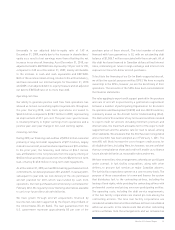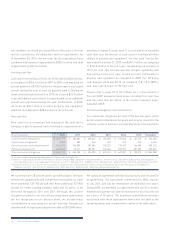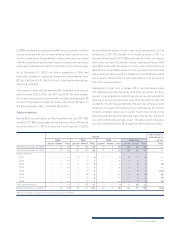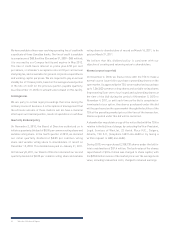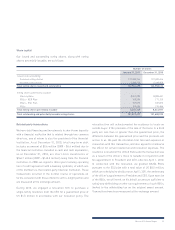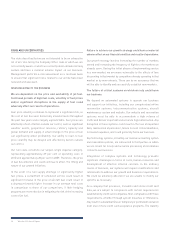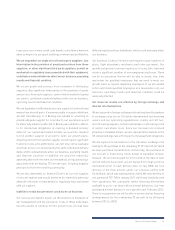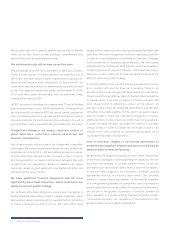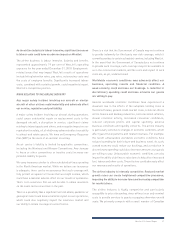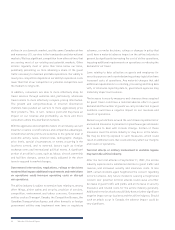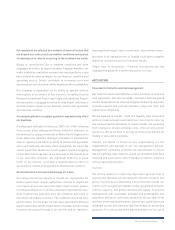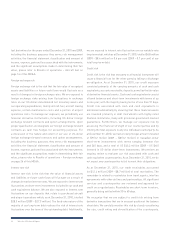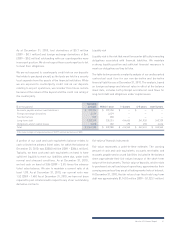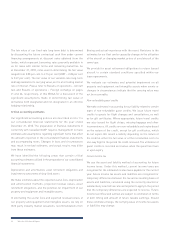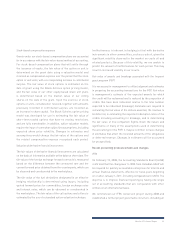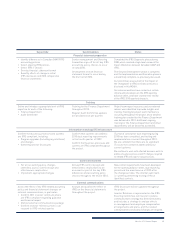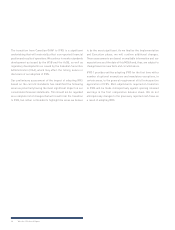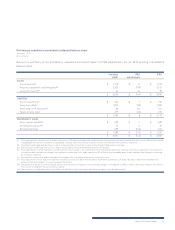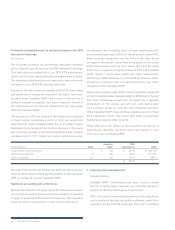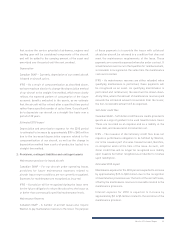Westjet 2010 Annual Report Download - page 41
Download and view the complete annual report
Please find page 41 of the 2010 Westjet annual report below. You can navigate through the pages in the report by either clicking on the pages listed below, or by using the keyword search tool below to find specific information within the annual report.
WestJet 2010 Annual Report 39
Our operations are affected by a number of external factors that
are beyond our control such as weather conditions and special
circumstances or events occurring in the locations we serve.
Delays or cancellations due to weather conditions and work
stoppages or strikes by airport workers, baggage handlers, air
traffic controllers and other workers not employed by us could
have a material adverse impact on our financial condition and
operating results. Delays contribute to increased costs and
decreased aircraft utilization, which negatively affect profitability.
Our business is dependent on its ability to operate without
interruption at a number of key airports, including Toronto
Pearson International Airport and Calgary International Airport.
An interruption or stoppage in service at a key airport could have a
material adverse impact on our business, results from operations
and financial condition.
A localized epidemic or a global pandemic may adversely affect
our business.
A widespread outbreak of influenza, SARS, the H1N1 influenza
virus or any other widespread illness (whether domestic or
international) or any governmental or World Health Organization
travel advisories (whether relating to Canadian or international
cities or regions) could affect our ability to continue full operations
and could materially adversely affect demand for air travel. We
cannot predict the likelihood of such a public health emergency
or the effect that it may have on our business or the market price
of our securities. However, any significant reduction in guest
traffic on our network could have a material adverse effect on
our business, results from operations and financial condition.
Governmental fee increases discourage air travel.
All commercial service airports in Canada are regulated by the
federal government. Airport authorities continue to implement
or increase various user fees that impact travel costs for guests,
including landing fees for airlines and airport improvement fees.
Airport authorities generally have the unilateral discretion to
implement and adjust such fees. The combined increased fees,
and increases in rents under various lease agreements between
airport authorities and the Government of Canada, which in many
instances are passed through to air carriers and air travellers,
may negatively impact travel, in particular, discretionary travel.
Increases in air navigation fees in Canada could have a negative
impact on our business and our financial results.
Please refer to Accounting – Financial instruments and risk
management below for a further discussion on risks.
ACCOUNTING
Financial instruments and risk management
Our financial assets and liabilities consist primarily of cash and
cash equivalents, accounts receivable, derivatives both designated
and not designated in an effective hedging relationship, deposits,
accounts payable and accrued liabilities, long-term debt, and
capital lease obligations.
We are exposed to market, credit and liquidity risks associated
with our financial assets and liabilities. From time to time, we
use various financial derivatives to reduce market risk exposures
from changes in foreign exchange rates, interest rates and jet
fuel prices. We do not hold or use any derivative instruments for
trading or speculative purposes.
Overall, our Board of Directors has responsibility for the
establishment and approval of our risk management policies.
Management continually performs risk assessments to ensure
t
hat all significant risks related to us and our operations have been
reviewed and assessed to reflect changes in market conditions
and our operating activities.
Fuel risk
The airline industry is inherently dependent upon jet fuel to
operate and, therefore, we are exposed to the risk of volatile fuel
prices. Fuel prices are affected by a host of factors outside our
control, such as significant weather events, geopolitical tensions,
refinery capacity, and global demand and supply. To provide
management with reasonable foresight and predictability into
operations and future cash flows, we periodically use short-term
and long-term financial derivatives. Upon proper qualification, we
designate our fuel derivatives as cash flow hedges for accounting
purposes. For a discussion of the nature and extent of our use of


